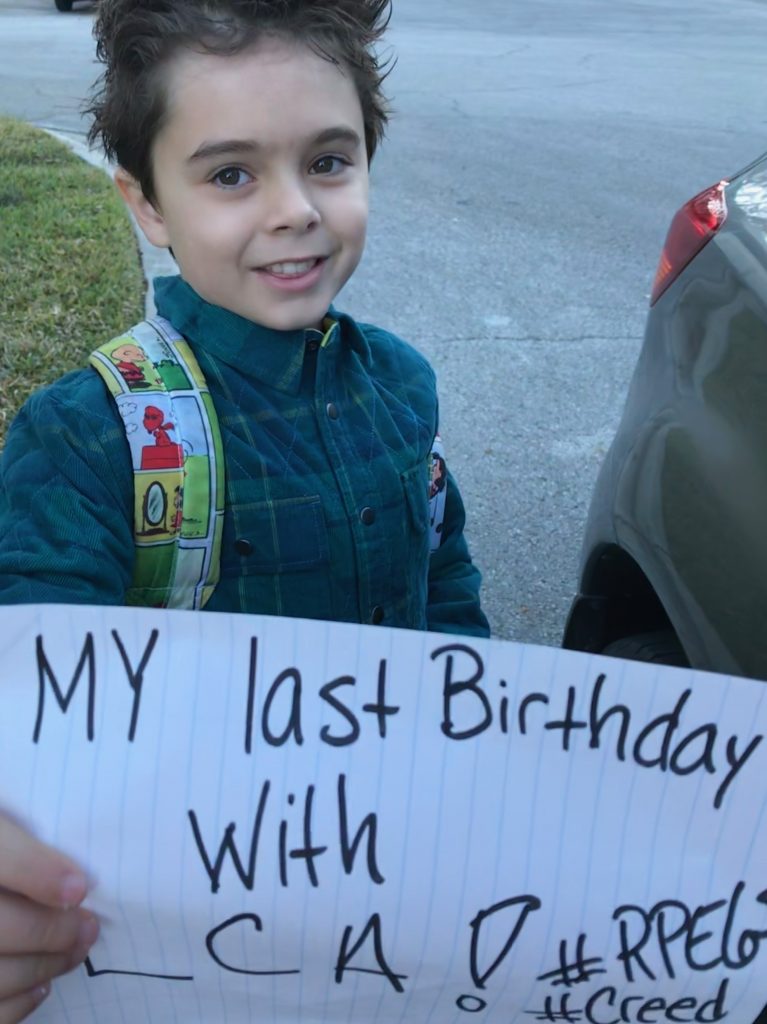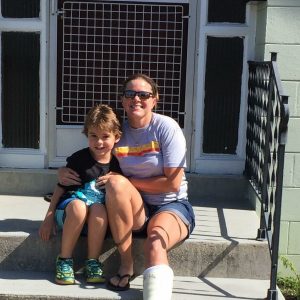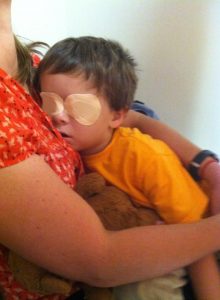Curing Blindness: The Road To Treatment With LUXTURNA™
This is the first in a series following the progress of Creed Pettit, a 9-year-old Florida third-grader, who is a candidate for the breakthrough gene-therapy drug called LUXTURNA™, approved as the first gene therapy for Leber congenital amaurosis, and as the first-ever genetic therapy in the United States for an inherited disease.

A birthday wish for 9-year-old Creed Pettit, diagnosed with LCA-RPE65, is that this birthday is his last with LCA! Image: Creed Pettit holds a sign that says “My last birthday with LCA! #RPE65 #Creed
A birthday wish for 9-year-old Creed Pettit, diagnosed with LCA-RPE65, comes closer than ever to coming true today when the Florida boy and his mom meet with a surgeon to schedule treatment with LUXTURNA™, the just-approved, revolutionary gene therapy that corrects his specific gene mutation.
Creed had wished that his January 9th birthday would mark his very last with LCA-RPE65.
This third time might truly be the charm for Creed, as his mom, 41-year-old Sarah St. Pierre-Pettit of Mount Dora, Fla., twice tried to get her son, at ages 3 and 4, into clinical gene-therapy trials in Iowa. He was not approved for the trial because he could not perform steps required by the study, such as trying to navigate a maze.
Sarah learned a few days ago that her insurance company gave the go-ahead to schedule the surgery that costs $850,000.
“No more hurdles,” she wrote in an email. “I am a wreck of happy tears!!!”
Sarah and her son drove to Miami’s Bascom Palmer Eye Institute to meet today with Dr. Audina Berrocal to discuss the procedure and answer questions.
Brand new treatment
It was last October when decades of research culminated in a Food and Drug Administration advisory committee hearing in which the group recommended approval of LUXTURNA™, Spark Therapeutics’ breakthrough gene-therapy treatment.
“One of the doctors spoke about my son in the FDA approval process, which was just amazing,” Sarah said. “That day I knew Creed could be treated.”

Creed and his mom, Sarah St. Pierre-Pettit of Mount Dora, Fla. Creed meets with his surgeon Feb. 19 to schedule his treatment with LUXTURNA to reverse his blindness caused by LCA-RPE65. Image: Creed and his mom Sarah sitting on steps.
Sofia Sees Hope founder and board chair Laura Manfre also counted among those speaking on behalf of this ground-breaking treatment, sharing with the committee a story of a woman whose vision greatly improved in the clinical trials and changed her life.
The FDA granted approval of the treatment in December, paving the way for patients like Creed with LCA-RPE65 to receive, LUXTURNA™, the first genetic therapy treatment for an inherited retinal disease (IRD), and the first genetic therapy in the United States created for any inherited disease.
RPE65 is a form of Leber congenital amaurosis in which the body can’t make a protein needed by the retina to convert light into vision-enabling signals, which are sent to the brain. This new therapy involves injecting under the retina a human-engineered virus containing copies of a normal gene, so cells can express the protein. LCA is a rare inherited retinal disease, and nearly 30 gene mutations are associated with it.
Creed said that after the surgery, he can’t wait to see a real rainbow and he can’t wait to throw his canes in the lake.
His mom, on speakerphone last week while driving to pick up a new batch of “Creed’s Cause” T-shirts that she designed, talked about her most recent effort to help pay for medical bills not covered by insurance, and for travel expenses.
At $20 apiece, Sarah sells them locally and through Facebook and Instagram. When she’s not making T-shirts, she’s an elementary school physical education assistant, and hosts trivia nights at a brewery owned by her sister and brother-in-law.
Creed is a third-grader at Mount Dora Christian Academy, a school that better serves his needs than the public system. MDCA is like family to Creed and his mom, hosting lots of fundraisers, including a January basketball event that raised $5,000. The Douglas G. Halliday Foundation of Orlando recently made a generous contribution, adding to the more than $100,000 raised from 5K races, a CrossFit event and contributions from many friends and people she doesn’t even know.
Missing milestones

In 2011, doctors diagnosed Creed with LCA; in the months following he received a genetic diagnosis of LCA-RPE65. Image: Toddler-aged Creed wearing patches over both eyes.
Sarah knew something was wrong with her baby shortly after he was born in January 2009.
“He missed all of the milestones. He would run into everything. He wasn’t walking. Instead, he did this weird Army crawl. He’d feel for his food and look up.
“Everything just said something’s not right.”
Then came the heartache of trying to figure out what was wrong. Doctors diagnosed Creed at 18 months old as autistic, and another said he had problems with his peripheral vision.
For the first year of Creed’s life, his mom thought he had colic because he would spend his days contentedly on a blanket outside, and at the end of the day when he went back into the house, he cried, all night.
An autism teacher advised Sarah to black out all the windows in the house, keep everything dark and not allow him to be in light, the exact opposite of what he needed.
She found the right advice from a woman specializing in depth perception and dyslexia. For the first time, and coming from a non-doctor, Sarah learned that her son probably was blind.
In 2011, doctors diagnosed Creed at 2 years and 8 months with LCA; in the months following he received a genetic diagnosis of LCA-RPE65. A week later, Sarah began her fundraising endeavors.
She also reached out for support that resulted in a team of therapists and specialists to address Creed’s movement, vision, speech, orientation, mobility and behavior.
Trying for a gene therapy trial
Sarah learned about RPE65 gene-therapy trials. She, her mother, Mary, and Creed traveled to Iowa twice for what turned out to be unsuccessful attempts to be part of the research.
Creed’s visual acuity is actually very good; when he has light, he can see. When he doesn’t have light, he can’t see anything. As Sarah says, “No light, no sight.”
He needed light and he got it, with his mom installing special bright lights all over the house.
“I’m positive they can see us in space,” she said of the lights in and around her home. Creed also has more light in school, including a light in his desk.
At school and in life, Creed has another light shining on him – his best buddy Michael, who bonded with him in first grade. He helps him be safe and gives Sarah updates about her son.
She said she can’t believe Michael’s maturity and sensitivity and believes he was put on this earth to help her son and others.
For Valentine’s Day, teachers filled bags with candy and sold them for $1 each, with proceeds going toward Creed’s expenses.
The words on the candy bag say, “Help Creed see how much we love him.”
